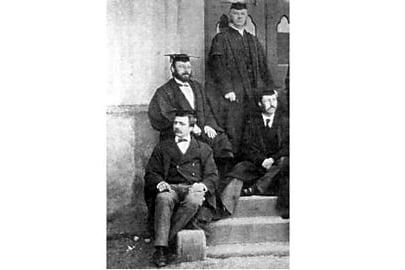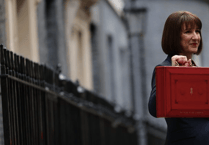Back in the spring of 1982, while visiting a friend in the Netherlands, the grim-faced mother of an otherwise cordial Dutch household dropped a day-old copy of The Sun newspaper onto the family breakfast table and asked me to explain why the British thought it appropriate to celebrate the death of 323 young Argentinians. The headline screamed ‘Gotcha’ and referred to the sinking of the light cruiser General Belgrano.
Mevrouw van Haag appeared absolutely furious with me, as though I were personally responsible for these casualties. She also expected me to denounce my country. But I was a feisty teenager and although ambivalent about the Falklands War, once overseas, felt duty bound to prop up our besieged flag and defend the indefensible. I cannot remember the excuses I offered but can recall the emotional discomfort provoked from that lengthy and heated exchange. Suddenly, irrationally, unexpectedly, and over cornflakes (for I did not fancy the horse meat) I had become the proxy target for outrage against British military tactics. In an instant, the welcoming atmosphere to which I was so accustomed in Holland was replaced by an alienating far-from-home sense of isolation.
This was neither the first nor last time I have cringed under the spotlight of collective accountability. From infancy, peoples of non-indigenous nationhood, race, or religion get used to being associated and implicated with perceived crimes perpetrated in any corner of the globe by their particular demographic. Routinely presumed to be acting defence counsel cum spokesman on all relating contentions and grievances.
Back to now, and this triple-aspect perch above the Aber Vaults offers an entertaining view of the corner of Queen’s Road and Vaynor Street - you know, by the Spar - that low curved wall that in fine weather is employed by residents as a communal bench. I oversaw their ongoing japes for several months before noticing the large dark plaque placed on the left-hand column supporting this low wall. It was a few more weeks before I took the time to wander across and read of a little mentioned example of collective accountability from the Aberystwyth history book.
Back in 1914, our Aberystwyth University faculty included one Professor Herman Ethé. He was a seventy-year-old lecturer in German and Oriental languages. Herman and his wife had lived here for decades having moved to Aber in 1875. Herman was a German and enjoyed a beer in his garden. Herman’s ebullient European habits did not go unnoticed, for 1914 was a time of temperance in non-conformist Wales. Unfortunately for Herman, 1914 also saw the onset of the First World War thus pitting his homeland against his adopted home.
At a time before social media, it was refugees arriving in Aberystwyth from Belgium that provided heartbreaking stories of escaping the Kaiser’s vicious army that led to an understandable uptick in anti-German sentiment among residents. Unfortunately, a couple of prominent councillors sensed an opportunity to further their own political ambitions. They rabble roused. Flyers were printed:
“As a protest against the return of Prof Ethé from Germany to teach in our Welsh national institution we intend to form a procession of workmen and others at one o’clock near Shiloh Chapel.”
Over 2,000 agitated townsfolk gathered at the chapel where the two councillors then urged the mob to march on Prof Ethé’s home, to give the family 24 hours to leave, or else drive them out. The mob descended on the Ethé residence in Caradog Road - you know, one of those posh little streets behind Bronglais Hospital. A terrified Professor Ethé and his wife left Aberystwyth the next day, never to return. They moved to Bristol. Herman died there just a few years later, reportedly a broken man and in abject poverty. A shameful example of collective accountability that we appear to have learned nothing from.
Right now, for many, intensified conflict in the Middle East provides the excuse to vent existing prejudices resulting in terrifying increases in both anti-Semitic and Islamophobic hate crimes across the UK and around the world. Last week, a mob of hundreds gathered at a Russian airport to intercept a flight from Tel Aviv, chanting anti-Semitic slogans and with an intention to make all disembarking passengers denounce Israel. The week before, a six-year old boy was stabbed to death in Illinois, USA, just for being of Palestinian heritage. In the UK, Jewish schools have been forced to close, synagogues and mosques require extra security. British kids and British worshippers have quickly become soft proxy targets. All extremely ignorant, all very cowardly.
Although we are most likely to witness cowardly mobs gathering on social media these days, unhelpful and simplistic sentiments sometimes spill onto our streets. Recent violent anti-asylum protests at the Stradey Park Hotel in Llanelli offer distasteful echoes of Professor Ethé’s experience. Fires started, police spat at, a bill of £300,000. As well as an act of egregious victimisation against those fleeing conflict and persecution, this was also an act of community self harm. If it comes to it, will they treat refugees from Gaza or Israel in the same unwelcoming fashion? I hope not. Maybe Llanelli will feel compelled to unveil their own shameful plaque at some point in the future.
One of the aspects of life I cherish is living in left-leaning west Wales. So it is no surprise that I find the majority of Aberystwyth residents distressed and angry with the unjustifiable outrages we are witnessing on our screens. For me, it is now imperative to ensure we do not tolerate or embrace injustice here in our fight against injustice abroad. It is imperative to maintain cool heads and use any influence we have to becalm. To beware the rabble rouser advancing their own interests and never be part of the ignorant mob.
When morally impelled, we march for change and not against people, for we know how revenge ends.
Never ever hold innocent individuals responsible for the actions of a state, but also appreciate that it is okay for those we disagree with to be sympathetic to the other cause. For I know from my visit to the Netherlands, from the war in Ukraine, that it is extremely difficult to remain unemotional and nuanced, or even acknowledge the opposing view, when one’s countrymen or friends are under fire. And this reality should be maintained front of mind by those of us fortunate enough to observe current events from the luxury of the periphery.




